In November 2023, the European Disability Forum (EDF) and the Global Action on Disability (GLAD) Network organised an online meeting on “Global Inclusion: Engaging donor offices and delegations for the inclusion of persons with disabilities in budgets, programmes and policies worldwide.” The meeting included speakers from donor countries, European Union Delegations (EUDs), Organisations of Persons with Disabilities (OPDs) and allies. Meeting participants explored avenues for enhancing the participation of persons with disabilities and OPDs in the global operations of donor countries.
Background
Over the years, donor countries, non-governmental organisations (NGOs), and delegations have implemented various global strategies to advance the promotion of the Convention on the Rights of Persons with Disabilities (CRPD). These strategies differ in their commitment to include persons with disabilities in policies, programmes, and budgetary considerations.
In general, the allocation of funds for disability-related projects within Official Development Assistance (ODA) remains notably low. The inclusion of disability into projects and policies is also consistently overlooked. This underscores the pressing need for heightened participation from individuals with disabilities and OPDs in international development initiatives. This imperative motivated EDF and the GLAD Network to convene the webinar, with the specific aim of exploring opportunities to enhance the involvement of individuals with disabilities and OPDs in the international activities of donor countries.
Meeting Structure
The meeting was divided into two sections:
- Guidance from Donors
- Experiences from OPDs and Allies
Eight distinguished speakers, four for each section, shared valuable insights and experiences related to disability inclusion within international cooperation and sustainable development. The meeting also incorporated panel discussions and Q&A sessions after both sets of presentations.
Guidance from Donors
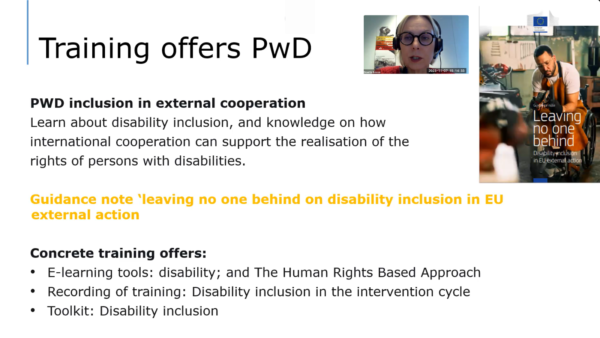
Speaking on behalf of the European Commission (EC), Doerte Bosse, Deputy Head of Unit of Social Inclusion and Protection, Health and Demography for International Partnerships, emphasised the EC’s commitment to disability inclusion in external cooperation. Stressing the significance of including persons with disabilities in everything to achieve the Sustainable Development Goals (SDGs). Doerte also outlined the EU’s alignment with the Strategy for the Rights of Persons with Disabilities 2021-2030 and the CRPD. Lastly, her presentation highlighted practical guidance, including the EU’s Guidance Note on “Leaving no one behind – Disability Inclusion in EU External Action” and outlined training initiatives, such as e-learning and toolkits the EU offers to their staff to better support them in mainstreaming disability in new programs.
A new strategic plan for the GLAD Network
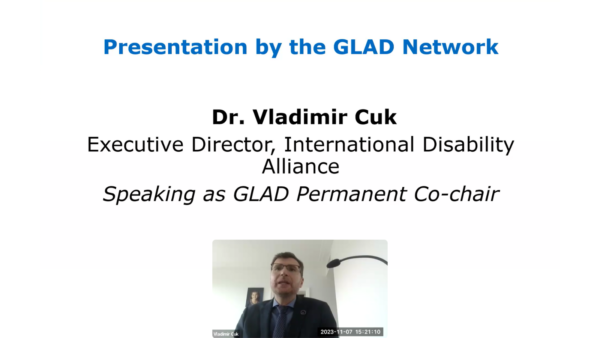
Dr. Vladimir Cuk, Executive Director of the International Disability Alliance (IDA), speaking on behalf of the GLAD Network, offered insights into its history, achievements, and goals. He underscored the ongoing necessity for sustained commitment and increased investment in disability inclusion. He concluded his presentation by emphasising the future goal of diversifying participants in the GLAD Network, with a specific focus on establishing a sustained and inclusive dialogue involving representatives from partner countries and not only donor countries. Acknowledging the gap and need for change, especially as the Network embarks on developing a new strategic plan, Vladimir encouraged outreach and collaboration.
4 steps for meaningful consultation
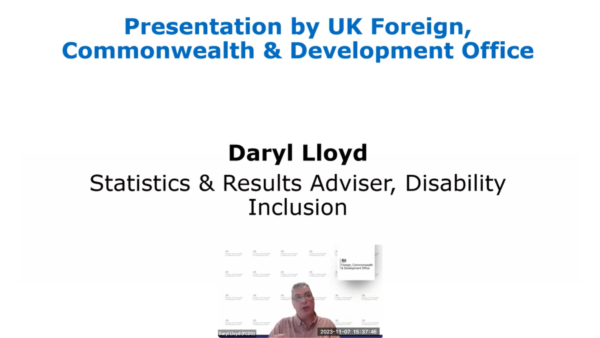
Daryl Lloyd, Statistics and Results Adviser of Disability Inclusion at the UK Foreign, Commonwealth & Development Office (FCDO), underscored the moral duty and practical necessity of ensuring the meaningful participation of persons with disabilities in development programs noting that “meaningful participation is crucial to people exercising their voices and making their choices know.” Daryl also highlighted the motivation behind producing a guidance note to align with FCDO’s expectations for country posts and headquarters teams, emphasising the incorporation of external expertise, including input from OPDs and civil society.
The guidance outlines four crucial steps for meaningful consultation:
- Think Ahead: ensuring purposeful and goal-oriented consultation;
- Clearly Communicate: communicating clearly, specifying goals and usage of responses with accessible documentation;
- Ensure Accessibility: ensuring accessibility, accommodating diverse preferences and needs in different channels and meetings;
- Learn and Feedback: emphasising the incorporation of feedback.
Though primarily for internal use, the full guidance has an external version accessible here.
Mainstreaming disability inclusion across projects and sectors
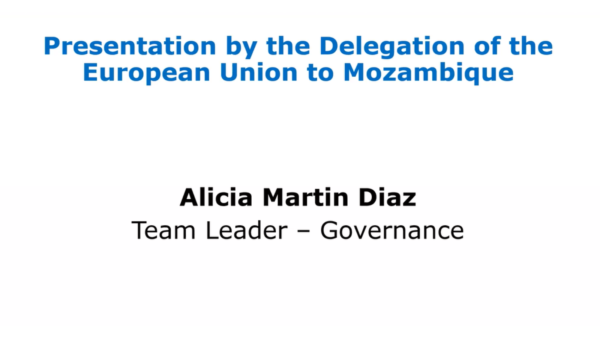
Alicia Martin Diaz, Team Leader – Governance of the Delegation of the European Union to Mozambique, shared the delegation’s efforts to make their cooperation inclusive in a systemic manner, emphasising specific programs and consultations with OPDs. Alicia also outlined the delegation’s commitment to inclusive cooperation within the EU’s global initiatives. With approximately 140 delegations worldwide, the EU addresses diverse priorities, allocating a substantial budget of 428 million euros for Mozambique’s development from 2022-2024. Emphasising the rights of persons with disabilities and gender, the delegation engages in targeted consultations with OPDs including the Forum of Disabled Persons Organisations of Mozambique (FAMOD). The delegation underscores the importance of mainstreaming disability inclusion across projects in various sectors, involving persons with disabilities in decision-making processes to address Mozambique’s unique challenges.
Experiences from OPDs and Allies
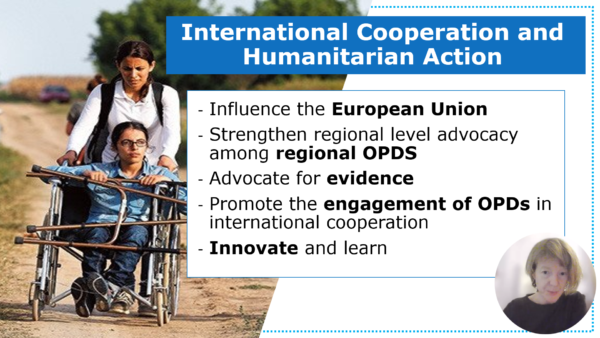
Catherine Naughton, Executive Director of EDF, explored how EDF actively influences the European Union (EU) to include the rights of persons with disabilities in various areas including EU external action. She emphasised that the EU, being the largest aid donor with about 140 delegations and offices worldwide, plays a crucial role in defining regional priorities and implementing programs. EU Delegations are of special interest to EDF. They can advocate for CRPD implementation, raise awareness on disability inclusion, call for projects and provide funding opportunities. Catherine discussed EDF’s efforts to create resources, including toolkits for persons with disabilities on engaging with EU delegations and for EU Delegations on including OPDs. as well as a guidance note to OPDs interested in approaching the EU and its delegations for funding opportunities.
Engaging with international program donors
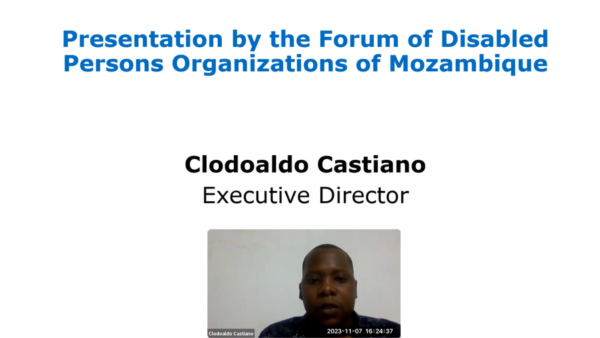
Clodoaldo Castiano, Executive Director of the Forum of Disabled Persons Organizations of Mozambique (FAMOD), shared insights into engaging with international program donors from the perspective of an OPD, emphasising the importance of acknowledging existing gaps. Clodoaldo cited the example of their engagement with the European Union (EU), where a meeting with the EU ambassador revealed gaps in program inclusivity and direct funding to OPDs. He stressed the need for donors to recognise and address these gaps.
Clodoaldo outlined strategies for OPDs in engaging with donors, including the importance of having an engagement plan. While acknowledging the resource challenges for sustained engagement, he suggested alternatives such as partnering with intermediaries or alliances. He emphasised the significance of accountability, with OPDs holding international cooperation partners responsible for reflecting disability inclusion in their interventions stating that “it’s important for donors at the local level to acknowledge the gaps in relation to the engagement with OPDs.”.
Ensuring the inclusion of persons with disabilities in communities
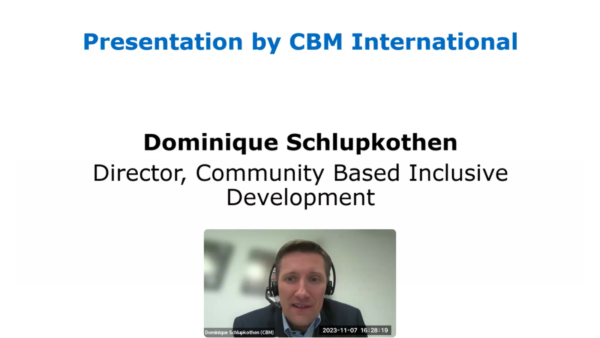
Dominique Schlupkothen, Director of Community Based Inclusive Development at CBM International, focused on Community-Based Inclusive Development (CBID) as a strategy to ensure the inclusion of persons with disabilities in communities. He highlighted the challenges faced by persons with disabilities in being excluded from consultations and program implementations, emphasising the need for collaboration between stakeholders, including international organisations and local OPDs.
A significant aspect of the presentation was discussing CBM International’s Inclusive Participation Toolbox, designed to provide practical guidance, support materials, and checklists for stakeholders in international cooperation to ensure the meaningful participation of external OPDs. The toolbox covers topics such as the importance of participation, strategies for inclusion, and practical support materials for inclusive meetings.
A key takeaway was the call for organisations to ask how they can include persons with disabilities in their work, such as developing inclusive policies and budgets, considering accessibility in events, and involving local organisations to ensure cultural relevance and contextual appropriateness. Dominique concluded by emphasising the continuous journey of making programs disability-inclusive, acknowledging that improvement is an ongoing process.
Transferring decision-making responsibilities from the donor to the beneficiary
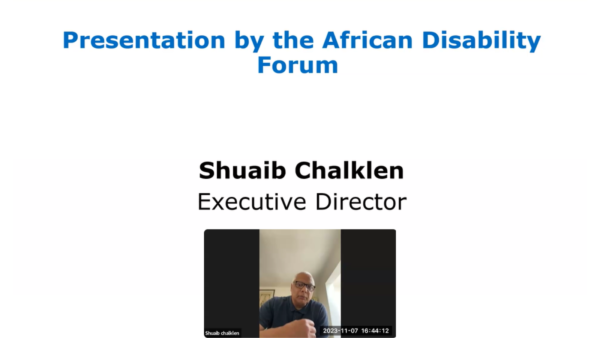
The last speaker, Shuaib Chalklen, Executive Director of the African Disability Forum (ADF), highlighted the successful partnership between ADF and Dutch NGOs funded by the Ministry of Foreign Affairs of the Netherlands, emphasizing the “We are able” program’s impact on food security and poverty reduction. A particularly noteworthy aspect of the presentation was the implementation of a “shift of power initiative” gradually transferring decision-making responsibilities from the donor country to ADF and the national entities involved.
The full recording of the meeting will be available soon. Please check back at a later date.
For more information, please contact Erika Hudson, International Cooperation Policy Officer: erika.hudson@edf-feph.org.